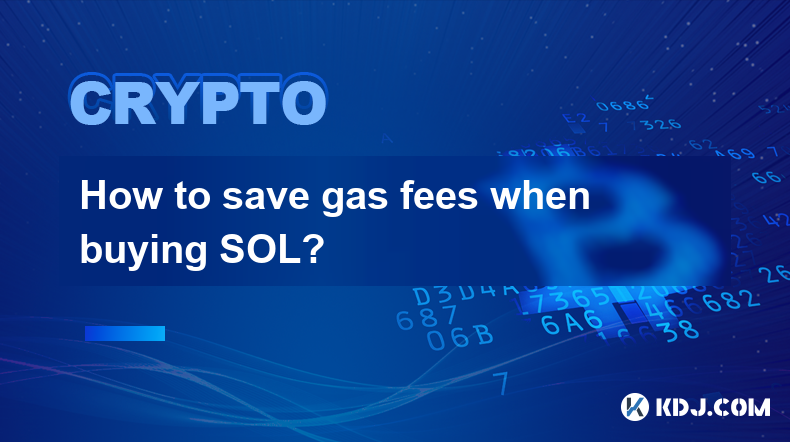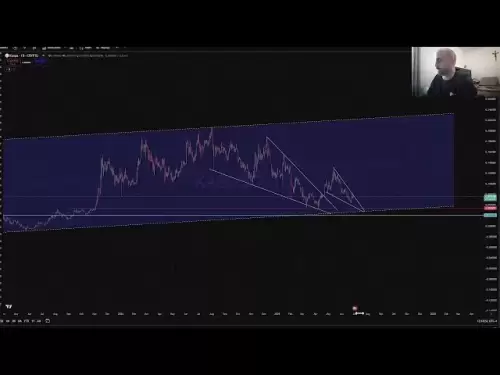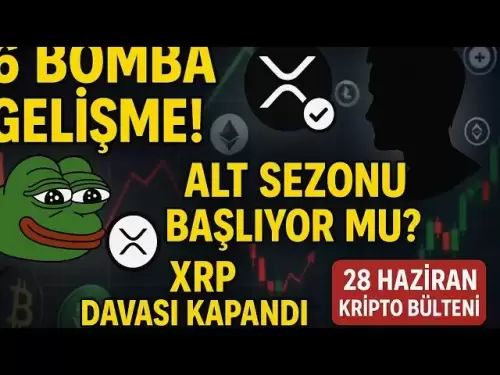-
 Bitcoin
Bitcoin $107,341.7259
0.15% -
 Ethereum
Ethereum $2,438.6204
0.70% -
 Tether USDt
Tether USDt $1.0003
-0.02% -
 XRP
XRP $2.1866
1.94% -
 BNB
BNB $649.0952
0.36% -
 Solana
Solana $150.9602
5.63% -
 USDC
USDC $0.9999
0.00% -
 TRON
TRON $0.2742
0.40% -
 Dogecoin
Dogecoin $0.1645
1.93% -
 Cardano
Cardano $0.5669
1.18% -
 Hyperliquid
Hyperliquid $37.8286
4.19% -
 Bitcoin Cash
Bitcoin Cash $491.4669
-2.74% -
 Sui
Sui $2.8150
3.06% -
 Chainlink
Chainlink $13.4184
2.91% -
 UNUS SED LEO
UNUS SED LEO $9.0809
0.27% -
 Avalanche
Avalanche $18.0295
2.60% -
 Stellar
Stellar $0.2396
1.19% -
 Toncoin
Toncoin $2.8587
0.13% -
 Shiba Inu
Shiba Inu $0.0...01160
2.59% -
 Litecoin
Litecoin $86.4192
1.45% -
 Hedera
Hedera $0.1486
1.19% -
 Monero
Monero $308.4324
0.87% -
 Polkadot
Polkadot $3.4202
1.43% -
 Bitget Token
Bitget Token $4.6436
-0.34% -
 Dai
Dai $0.9998
-0.02% -
 Ethena USDe
Ethena USDe $1.0002
0.00% -
 Uniswap
Uniswap $7.1527
3.29% -
 Pi
Pi $0.5357
-8.45% -
 Pepe
Pepe $0.0...09588
4.61% -
 Aave
Aave $259.9759
0.81%
How to save gas fees when buying SOL?
To save on Solana gas fees, buy SOL during off-peak hours, use exchanges that absorb fees, and consider smaller, batched transactions.
Apr 02, 2025 at 12:14 am

Understanding Solana Gas Fees
Solana, like other blockchains, charges transaction fees, commonly known as gas fees. These fees compensate validators for processing transactions on the network. The cost of these fees fluctuates based on network congestion. High network activity leads to higher gas fees, while periods of low activity result in lower fees. Understanding this dynamic is crucial for minimizing your expenses. The amount you pay directly depends on the complexity of your transaction and the current network conditions.
Choosing the Right Exchange
Different cryptocurrency exchanges have different fee structures. Some exchanges may absorb gas fees, while others pass them directly to the user. Researching exchanges that offer lower fees or absorb them entirely is a critical first step in saving money. Compare fee schedules across multiple platforms before committing to a purchase. Look for transparent fee structures clearly outlining all charges associated with buying SOL.
Timing Your Purchases Strategically
Network congestion often peaks during periods of high trading volume. Consider purchasing SOL during off-peak hours or on less busy days. This can significantly reduce the gas fees you incur. Monitoring network activity through blockchain explorers or dedicated Solana tracking tools can help you identify optimal times to trade. Weekend trading often sees lower activity and subsequently lower fees.
Optimizing Transaction Size
Larger transactions generally incur higher gas fees. This is because they require more computational resources to process. If purchasing a large amount of SOL, consider breaking it into smaller, more manageable transactions. This strategy can help distribute the fees over time and potentially reduce the overall cost. However, remember that multiple transactions also mean multiple fees, so carefully weigh the benefits.
Using a Hardware Wallet
While not directly reducing gas fees, using a hardware wallet enhances security and can indirectly contribute to cost savings. Hardware wallets offer better security, reducing the risk of lost funds due to compromised accounts. This security benefit can indirectly save you money by mitigating the potential costs associated with recovering lost funds or dealing with fraudulent activity.
Batching Transactions
If you need to execute multiple transactions related to SOL, consider batching them. Some platforms or tools allow you to combine several transactions into one, thereby reducing the overall number of transactions and consequently the total gas fees. This method is particularly efficient when performing multiple actions such as transferring SOL, staking, or interacting with decentralized applications (dApps).
Utilizing Layer-2 Solutions
Layer-2 scaling solutions aim to alleviate congestion on the main Solana blockchain. These solutions, such as Solana Pay, process transactions off-chain, significantly reducing the load on the main network. Using Layer-2 solutions, when available, can lead to lower transaction fees. However, ensure the Layer-2 solution you choose is reputable and secure.
Monitoring Network Congestion
Before initiating a purchase, check the current network congestion level. Many websites and tools provide real-time data on Solana network activity. By monitoring congestion, you can make informed decisions about the timing of your transactions to minimize fees. This proactive approach allows you to avoid peak periods when fees are typically at their highest.
Choosing the Right Transaction Type
Different transaction types on Solana may have varying gas fee requirements. Understanding these differences can help you optimize your transactions. Research the various transaction types and choose the one most appropriate for your needs to potentially reduce costs. Consult the Solana documentation or relevant resources for detailed information on transaction types and their associated fees.
Frequently Asked Questions
Q: Are gas fees on Solana always the same?
A: No, gas fees on Solana are dynamic and fluctuate based on network congestion. Higher network activity leads to higher fees, while lower activity results in lower fees.
Q: Can I avoid gas fees entirely when buying SOL?
A: While it's difficult to avoid gas fees completely, you can significantly reduce them through strategic timing, using the right exchange, and employing other methods described above. Some exchanges may absorb the fees, but this is not always the case.
Q: What are the typical gas fees for buying SOL?
A: The typical gas fees vary considerably depending on network conditions. They can range from very low amounts during periods of low activity to significantly higher amounts during periods of high congestion.
Q: How can I track Solana network congestion?
A: You can monitor Solana network congestion through various online tools and resources dedicated to tracking blockchain activity. These tools usually provide real-time data on transaction volume and network load.
Q: Are there any resources that provide real-time Solana gas fee information?
A: Yes, several websites and applications provide real-time information on Solana gas fees. A quick search online will reveal many options. Many cryptocurrency exchanges also display estimated gas fees before you confirm a transaction.
Q: What happens if I don't have enough SOL to cover gas fees?
A: Your transaction will fail if you don't have sufficient SOL to cover the gas fees. Ensure you have enough SOL in your wallet to cover both the purchase price and the associated transaction fees.
Q: Is it better to buy a large amount of SOL at once or in smaller batches?
A: This depends on your risk tolerance and the current network conditions. Buying in smaller batches can help manage gas fees but might expose you to price fluctuations. Buying in bulk might result in higher gas fees but potentially save on trading fees.
Q: Do all Solana wallets charge the same gas fees?
A: No, the gas fees are determined by the Solana network, not the wallet itself. However, some wallets might offer features that indirectly help manage gas fees, such as batching transactions.
Q: Can I predict Solana gas fees accurately?
A: No, accurately predicting Solana gas fees is impossible due to their dynamic nature. However, you can monitor network conditions and historical data to get a better idea of potential costs.
Disclaimer:info@kdj.com
The information provided is not trading advice. kdj.com does not assume any responsibility for any investments made based on the information provided in this article. Cryptocurrencies are highly volatile and it is highly recommended that you invest with caution after thorough research!
If you believe that the content used on this website infringes your copyright, please contact us immediately (info@kdj.com) and we will delete it promptly.
- Trump, Bitcoin, and Peter Schiff: A New York Minute on Crypto Chaos
- 2025-06-29 12:30:12
- BTC Price, BlackRock ETF, Fed Signals: Decoding the Crypto Crossroads
- 2025-06-29 12:30:12
- SEI Price Skyrockets Amid ETF Hype and Bullish Uptrend: What's Next?
- 2025-06-29 12:50:11
- Bitcoin Mining, Cryptocurrency, and Blockchain: A New York State of Mind
- 2025-06-29 13:10:11
- Pengu, Altcoin, Leads Charge: What's Driving the Meme Coin Frenzy?
- 2025-06-29 13:30:12
- Bitcoin Market Navigates the Neutral Zone: An On-Chain Data Perspective
- 2025-06-29 13:50:12
Related knowledge

How to customize USDT TRC20 mining fees? Flexible adjustment tutorial
Jun 13,2025 at 01:42am
Understanding USDT TRC20 Mining FeesMining fees on the TRON (TRC20) network are essential for processing transactions. Unlike Bitcoin or Ethereum, where miners directly validate transactions, TRON uses a delegated proof-of-stake (DPoS) mechanism. However, users still need to pay bandwidth and energy fees, which are collectively referred to as 'mining fe...

USDT TRC20 transaction is stuck? Solution summary
Jun 14,2025 at 11:15pm
Understanding USDT TRC20 TransactionsWhen users mention that a USDT TRC20 transaction is stuck, they typically refer to a situation where the transfer of Tether (USDT) on the TRON blockchain has not been confirmed for an extended period. This issue may arise due to various reasons such as network congestion, insufficient transaction fees, or wallet-rela...

How to cancel USDT TRC20 unconfirmed transactions? Operation guide
Jun 13,2025 at 11:01pm
Understanding USDT TRC20 Unconfirmed TransactionsWhen dealing with USDT TRC20 transactions, it’s crucial to understand what an unconfirmed transaction means. An unconfirmed transaction is one that has been broadcasted to the blockchain network but hasn’t yet been included in a block. This typically occurs due to low transaction fees or network congestio...

How to check USDT TRC20 balance? Introduction to multiple query methods
Jun 21,2025 at 02:42am
Understanding USDT TRC20 and Its ImportanceUSDT (Tether) is one of the most widely used stablecoins in the cryptocurrency market. It exists on multiple blockchain networks, including TRC20, which operates on the Tron (TRX) network. Checking your USDT TRC20 balance accurately is crucial for users who hold or transact with this asset. Whether you're sendi...

What to do if USDT TRC20 transfers are congested? Speed up trading skills
Jun 13,2025 at 09:56am
Understanding USDT TRC20 Transfer CongestionWhen transferring USDT TRC20, users may occasionally experience delays or congestion. This typically occurs due to network overload on the TRON blockchain, which hosts the TRC20 version of Tether. Unlike the ERC20 variant (which runs on Ethereum), TRC20 transactions are generally faster and cheaper, but during...

The relationship between USDT TRC20 and TRON chain: technical background analysis
Jun 12,2025 at 01:28pm
What is USDT TRC20?USDT TRC20 refers to the Tether (USDT) token issued on the TRON blockchain using the TRC-20 standard. Unlike the more commonly known ERC-20 version of USDT (which runs on Ethereum), the TRC-20 variant leverages the TRON network's infrastructure for faster and cheaper transactions. The emergence of this version came as part of Tether’s...

How to customize USDT TRC20 mining fees? Flexible adjustment tutorial
Jun 13,2025 at 01:42am
Understanding USDT TRC20 Mining FeesMining fees on the TRON (TRC20) network are essential for processing transactions. Unlike Bitcoin or Ethereum, where miners directly validate transactions, TRON uses a delegated proof-of-stake (DPoS) mechanism. However, users still need to pay bandwidth and energy fees, which are collectively referred to as 'mining fe...

USDT TRC20 transaction is stuck? Solution summary
Jun 14,2025 at 11:15pm
Understanding USDT TRC20 TransactionsWhen users mention that a USDT TRC20 transaction is stuck, they typically refer to a situation where the transfer of Tether (USDT) on the TRON blockchain has not been confirmed for an extended period. This issue may arise due to various reasons such as network congestion, insufficient transaction fees, or wallet-rela...

How to cancel USDT TRC20 unconfirmed transactions? Operation guide
Jun 13,2025 at 11:01pm
Understanding USDT TRC20 Unconfirmed TransactionsWhen dealing with USDT TRC20 transactions, it’s crucial to understand what an unconfirmed transaction means. An unconfirmed transaction is one that has been broadcasted to the blockchain network but hasn’t yet been included in a block. This typically occurs due to low transaction fees or network congestio...

How to check USDT TRC20 balance? Introduction to multiple query methods
Jun 21,2025 at 02:42am
Understanding USDT TRC20 and Its ImportanceUSDT (Tether) is one of the most widely used stablecoins in the cryptocurrency market. It exists on multiple blockchain networks, including TRC20, which operates on the Tron (TRX) network. Checking your USDT TRC20 balance accurately is crucial for users who hold or transact with this asset. Whether you're sendi...

What to do if USDT TRC20 transfers are congested? Speed up trading skills
Jun 13,2025 at 09:56am
Understanding USDT TRC20 Transfer CongestionWhen transferring USDT TRC20, users may occasionally experience delays or congestion. This typically occurs due to network overload on the TRON blockchain, which hosts the TRC20 version of Tether. Unlike the ERC20 variant (which runs on Ethereum), TRC20 transactions are generally faster and cheaper, but during...

The relationship between USDT TRC20 and TRON chain: technical background analysis
Jun 12,2025 at 01:28pm
What is USDT TRC20?USDT TRC20 refers to the Tether (USDT) token issued on the TRON blockchain using the TRC-20 standard. Unlike the more commonly known ERC-20 version of USDT (which runs on Ethereum), the TRC-20 variant leverages the TRON network's infrastructure for faster and cheaper transactions. The emergence of this version came as part of Tether’s...
See all articles

























































































